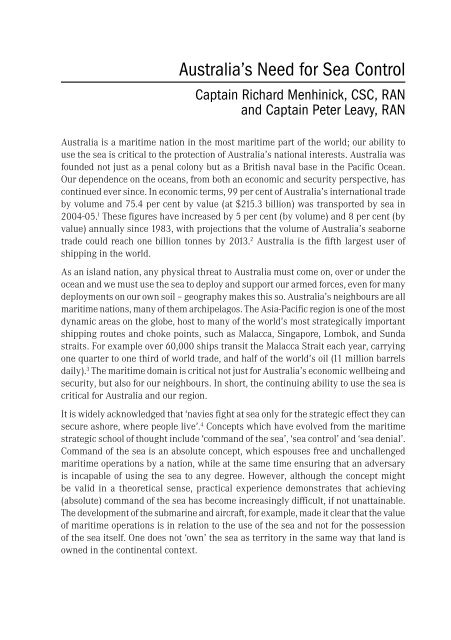Australian Maritime Issues 2007 - Royal Australian Navy
Australian Maritime Issues 2007 - Royal Australian Navy
Australian Maritime Issues 2007 - Royal Australian Navy
Create successful ePaper yourself
Turn your PDF publications into a flip-book with our unique Google optimized e-Paper software.
Australia’s Need for Sea Control<br />
Captain Richard Menhinick, CSC, RAN<br />
and Captain Peter Leavy, RAN<br />
Australia is a maritime nation in the most maritime part of the world; our ability to<br />
use the sea is critical to the protection of Australia’s national interests. Australia was<br />
founded not just as a penal colony but as a British naval base in the Pacific Ocean.<br />
Our dependence on the oceans, from both an economic and security perspective, has<br />
continued ever since. In economic terms, 99 per cent of Australia’s international trade<br />
by volume and 75.4 per cent by value (at $215.3 billion) was transported by sea in<br />
2004-05. 1 These figures have increased by 5 per cent (by volume) and 8 per cent (by<br />
value) annually since 1983, with projections that the volume of Australia’s seaborne<br />
trade could reach one billion tonnes by 2013. 2 Australia is the fifth largest user of<br />
shipping in the world.<br />
As an island nation, any physical threat to Australia must come on, over or under the<br />
ocean and we must use the sea to deploy and support our armed forces, even for many<br />
deployments on our own soil – geography makes this so. Australia’s neighbours are all<br />
maritime nations, many of them archipelagos. The Asia-Pacific region is one of the most<br />
dynamic areas on the globe, host to many of the world’s most strategically important<br />
shipping routes and choke points, such as Malacca, Singapore, Lombok, and Sunda<br />
straits. For example over 60,000 ships transit the Malacca Strait each year, carrying<br />
one quarter to one third of world trade, and half of the world’s oil (11 million barrels<br />
daily). 3 The maritime domain is critical not just for Australia’s economic wellbeing and<br />
security, but also for our neighbours. In short, the continuing ability to use the sea is<br />
critical for Australia and our region.<br />
It is widely acknowledged that ‘navies fight at sea only for the strategic effect they can<br />
secure ashore, where people live’. 4 Concepts which have evolved from the maritime<br />
strategic school of thought include ‘command of the sea’, ‘sea control’ and ‘sea denial’.<br />
Command of the sea is an absolute concept, which espouses free and unchallenged<br />
maritime operations by a nation, while at the same time ensuring that an adversary<br />
is incapable of using the sea to any degree. However, although the concept might<br />
be valid in a theoretical sense, practical experience demonstrates that achieving<br />
(absolute) command of the sea has become increasingly difficult, if not unattainable.<br />
The development of the submarine and aircraft, for example, made it clear that the value<br />
of maritime operations is in relation to the use of the sea and not for the possession<br />
of the sea itself. One does not ‘own’ the sea as territory in the same way that land is<br />
owned in the continental context.
















